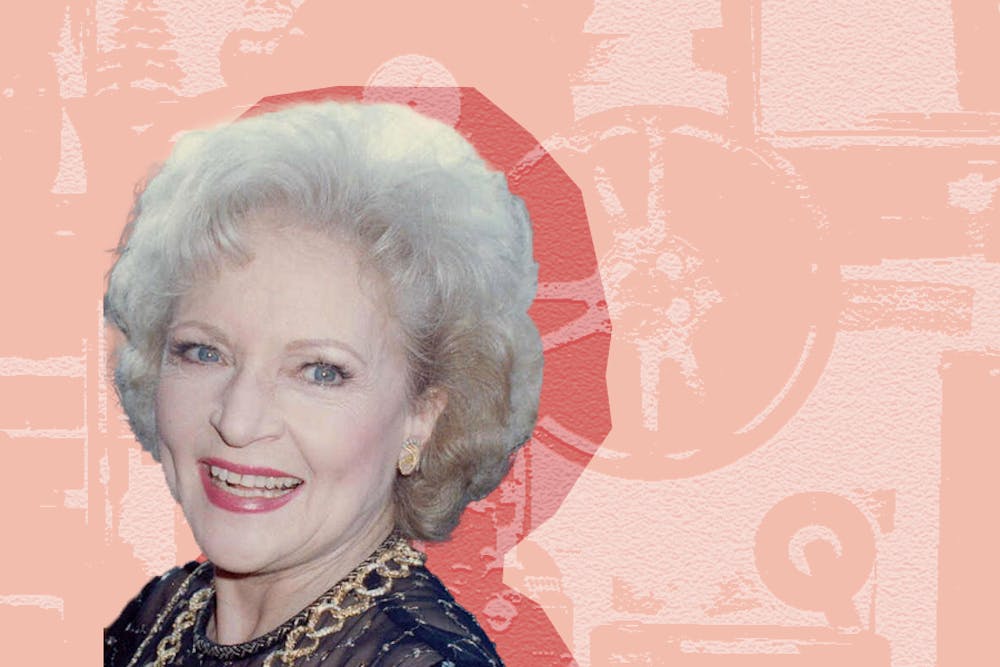On Dec. 31, 2021, Betty White passed away, just two and a half weeks shy of her centennial birthday. She was 99 years old, yet her death sent shock waves through the entertainment world; many, including myself, couldn’t fathom that such an ever–present force in Hollywood was gone.
White, often referred to as “The First Lady of Television,” was relevant until the end, and despite her full life and legacy, I shed tears over her death. Her work transcended every genre and every generation, and through her extensive filmography, I felt personally connected to the veteran actress. Only two days prior, I'd read the People magazine cover story that celebrated the assumed centennial milestone, featuring one of her final print interviews. As always, she was assuredly herself: quick–witted, outspoken, and endearingly optimistic.
White was a television mainstay from the get–go. She experienced the birth of the medium, appearing on an experimental television show in 1939 before the form truly took off. However, it wasn’t until after a stint in the American Women’s Voluntary Services during WWII and several radio jobs in the 1940s that she began to regularly appear on television, first as the co–host of the variety show Hollywood on Television. As the Golden Age of radio fizzled out, White continued to thrive as a performer on the new national mass media. When Al Jarvis left the show in 1952, she assumed hosting duties, ushering in a television career that would span eight decades.
In every genre that Betty White engaged with, she seemed to break boundaries. In 1953, White would star in her first sitcom, Life With Elizabeth, which was produced by Bandy Productions, a production company that she, Don Fedderson, and George Tibbles had founded. With this show, White became the first woman to produce and star in a sitcom in the United States, as well as one of the first actresses to be nominated at the Emmy Awards. She notably hired Betty Turbiville rather than a male director. Additionally, White was nicknamed the “First Lady of Gameshows” for being a common face on those programs in the '60s. She became the first woman to win a Daytime Emmy for Outstanding Game Show Host in 1983 for Just Men!
White was not solely a pioneer on the silver screen, but a burgeoning advocate behind the scenes as well. Her daytime talk show, The Betty White Show, which was a product of her time on Hollywood on Television, was met with controversy when it moved to NBC in 1954. Many Southern audience members criticized the inclusion of Arthur Duncan, a black tap dancer, amongst the show's number of variety acts. Rather than fire Duncan, White told her audience to "live with it" and subsequently gave him more airtime, resulting in the show’s quiet cancellation later that same year.
That said, this was not the only time the veteran actress tiptoed into the waters of activism. In an interview with Larry King in 2014, she would affirm her support for LGBTQ rights. Moreover, White was a passionate animal welfare activist who worked with the Los Angeles Zoo Association for over thirty years. In fact, her passion for animals is so well–documented that the Betty White Challenge, which emerged after her death, encourages her supporters to make a donation to their local animal shelter on Jan. 17, which would've been White’s 100th birthday.
White’s most renowned roles were as Sue Ann Nivens on The Mary Tyler Moore Show in 1973 and as Rose Nylund on The Golden Girls in 1985. The Mary Tyler Moore Show, which reflected the second–wave feminism that White spearheaded, depicted modern women in a way that the medium hadn't seen. A decade later, White starred in The Golden Girls, a gold standard of televised success that would see her become one of the most recognizable faces in entertainment. Fans of this boisterous senior citizen sitcom have passed on the work to their children, introducing White to a new generation.
Though White appeared in guest roles throughout the '90s and 2000s, her 2009 role in The Proposal saw the resurgence in her career that cemented her as a national treasure. A Snickers commercial for the 2010 Super Bowl would yield a Facebook campaign for her to host SNL, which she later would on May 8, 2010, winning the 2010 Primetime Emmy Award for Outstanding Guest Actress in a Comedy Series. This would introduce her to yet another generation of fans, and she would star in Hot in Cleveland in her late eighties.
Losing Betty White means losing the guiding hand of an industry I've long been enamored with. As television grew, she grew with it, and until her death, the public could rest assured that her presence was a guarantee in the evolving medium.
In a statement to People magazine following her death, White’s agent Jeff Witjas commented, “Even though Betty was about to be 100, I thought she would live forever.” It occurred to me that I did too. A once–advertised 100th birthday celebration is now a memorial, and it’s difficult to reconcile that somebody who lived so long didn’t seem to quite live long enough. That said, White was always a woman who had a positive relationship with death: In a 2012 interview, she commented that “whenever we’d lose somebody very close and very dear, [her mother] would always say, ‘Well, now he knows the secret.’” Well, now she knows the secret too, and I hope it’s as golden as her.







